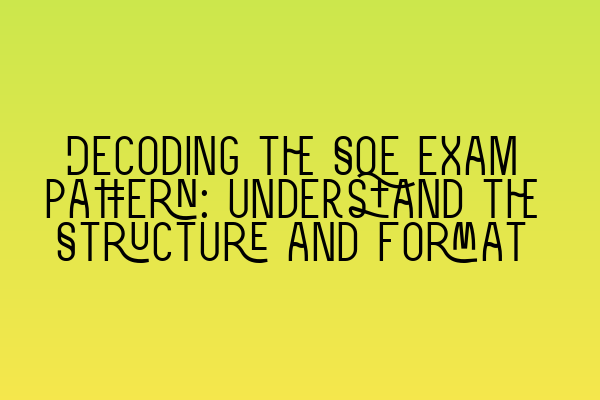Decoding the SQE Exam Pattern: Understand the Structure and Format
Preparing for the Solicitors Qualifying Examination (SQE) can be a daunting task, especially if you are not familiar with the exam pattern and format. Understanding the structure of the exam is crucial to develop a solid study strategy and maximize your chances of success. In this article, we will decode the SQE exam pattern to help you navigate through the exam with confidence.
What is the SQE Exam?
The Solicitors Qualifying Examination (SQE) is a standardized assessment that every aspiring solicitor in England and Wales must pass to qualify as a solicitor. It replaces the previous Qualified Lawyers Transfer Scheme (QLTS) and offers a more streamlined and comprehensive approach to assess candidates’ competency.
The SQE exam consists of two stages: SQE1 and SQE2. In SQE1, candidates are assessed on their knowledge of substantive and procedural law. SQE2 focuses on practical legal skills, including client interviewing, advocacy, and legal writing. Both stages must be passed to qualify as a solicitor.
SQE1 Exam Structure and Format
The SQE1 exam evaluates candidates’ understanding of the law and their ability to apply legal principles to different scenarios. It consists of two parts: multiple-choice questions (MCQs) and written tasks.
The MCQ section comprises 180 questions, divided into two skills areas: functioning legal knowledge (FLK) and applied legal knowledge (ALK). The FLK section tests your foundational legal knowledge, while the ALK section assesses your ability to apply legal principles to practical scenarios.
In addition to the MCQs, there are also written tasks that require candidates to draft legal documents and provide written advice. These tasks assess your legal writing and analytical skills. It’s important to practice writing concise and well-structured answers to excel in this section.
SQE2 Exam Structure and Format
The SQE2 exam focuses on testing candidates’ practical legal skills. It assesses your ability to perform various tasks that solicitors encounter in their everyday practice. The exam consists of simulated client interviews, oral advocacy exercises, and written skills assessments.
In the client interview section, candidates simulate an interview scenario with an actor playing the role of a client. You will be assessed on your ability to gather relevant information, provide legal advice, and demonstrate professional conduct.
The oral advocacy exercises evaluate your ability to present legal arguments in a simulated courtroom setting. You may be required to present opening statements, cross-examine witnesses, or deliver closing arguments. Preparation and practice are key to excel in this section.
In the written skills assessments, candidates are evaluated on their ability to draft legal documents, including contracts, letters, and statements of case. Attention to detail, clarity of expression, and legal accuracy are of utmost importance in this section.
Preparing for the SQE Exam
Now that you understand the structure and format of the SQE exam, it’s time to develop a strategic study plan. Here are a few tips to help you prepare effectively:
- Start early: The SQE exam requires thorough preparation, so don’t leave it until the last minute. Begin your studies well in advance to allow sufficient time to cover all the required topics.
- Create a study schedule: Plan your study sessions in advance and allocate dedicated time for each subject. Breaking down your studying into smaller tasks can make it more manageable and help you stay organized.
- Utilize online resources: Take advantage of online SQE study materials, interactive mock tests, and practice questions. These resources can help you familiarize yourself with the exam format and identify areas where you need further improvement.
- Seek expert guidance: Consider enrolling in SQE training programs or workshops that provide hands-on training and guidance from experienced solicitors. These programs can provide valuable insights and tips to enhance your exam performance.
- Practice, practice, practice: Practice is key to mastering the SQE exam. Solve as many practice questions and mock tests as possible to develop your critical thinking skills, time management, and exam technique.
Related Articles
For further insights into specific legal topics, check out these related articles:
- Legal Considerations in Residential Leases: Essential Insights for Solicitors
- Lease Laws in the UK: Unraveling the Legal Framework for Tenants
- Workshops on Land Law: Hands-On Training for Effective Practice
- Differences Between Commercial and Residential Property Laws: Examining Contrasting Regulations
- Interactive SQE Mock Tests for Property: Enhance Your Exam Performance
By understanding the structure and format of the SQE exam, and with diligent preparation, you can increase your chances of success. Stay focused, stay motivated, and remember that every step you take towards your goal brings you closer to becoming a qualified solicitor.

Leave a Reply